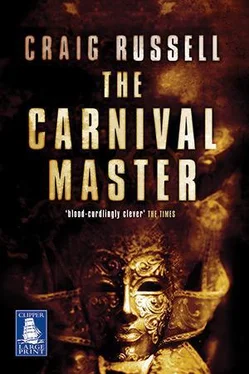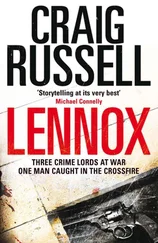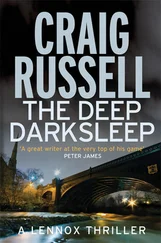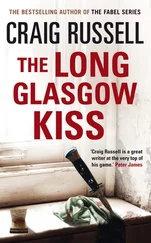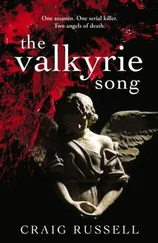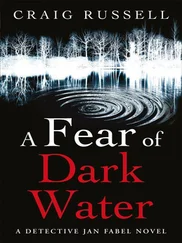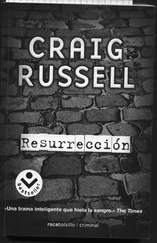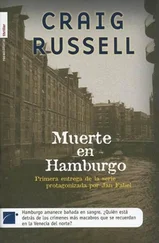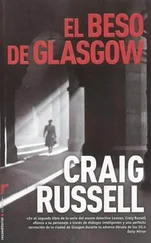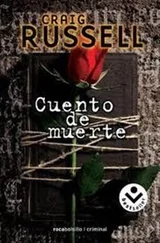Craig Russell - The Carnival Master
Здесь есть возможность читать онлайн «Craig Russell - The Carnival Master» весь текст электронной книги совершенно бесплатно (целиком полную версию без сокращений). В некоторых случаях можно слушать аудио, скачать через торрент в формате fb2 и присутствует краткое содержание. Жанр: Триллер, на английском языке. Описание произведения, (предисловие) а так же отзывы посетителей доступны на портале библиотеки ЛибКат.
- Название:The Carnival Master
- Автор:
- Жанр:
- Год:неизвестен
- ISBN:нет данных
- Рейтинг книги:3 / 5. Голосов: 1
-
Избранное:Добавить в избранное
- Отзывы:
-
Ваша оценка:
- 60
- 1
- 2
- 3
- 4
- 5
The Carnival Master: краткое содержание, описание и аннотация
Предлагаем к чтению аннотацию, описание, краткое содержание или предисловие (зависит от того, что написал сам автор книги «The Carnival Master»). Если вы не нашли необходимую информацию о книге — напишите в комментариях, мы постараемся отыскать её.
The Carnival Master — читать онлайн бесплатно полную книгу (весь текст) целиком
Ниже представлен текст книги, разбитый по страницам. Система сохранения места последней прочитанной страницы, позволяет с удобством читать онлайн бесплатно книгу «The Carnival Master», без необходимости каждый раз заново искать на чём Вы остановились. Поставьте закладку, и сможете в любой момент перейти на страницу, на которой закончили чтение.
Интервал:
Закладка:
Andrea had been booked for two hours and the agency knew she would phone back to confirm that she had been paid and was safely away from the client. Not that anyone worried seriously about Andrea: it was more than evident that she could easily look after herself. But, she knew, if she were ever to experience difficulties, a couple of heavies were on call.
She always thought of her clients as small men. They probably thought of themselves that way too. It didn’t have to do with height – this client was at least 180 centimetres tall – it had to do with the way they saw themselves. How she saw them. The client was in his forties, thin and pale; his suit was middle-budget, as was the hotel room. He sat on the edge of the bed, his expression a mixture of nervousness and excitement. Andrea did nothing to put him at his ease, which was as it should be. She confirmed his name and demanded the envelope with the money: Andrea always asked for cash. She checked the amount and stuffed the envelope into her bag.
‘Strip,’ she commanded and removed her raincoat, jeans and baggy woollen top. Beneath she was dressed in an assembly of black leather straps and buckles that left her breasts and genitals exposed. As usual she had done a full workout before coming out to her client and her oiled muscles were hard and sleek. The man on the bed gazed at her with an expression of awe. He was now naked and Andrea looked down at his erection with an expression of contempt.
‘Stand,’ she ordered. He obeyed. ‘You can touch me.’
The client ran trembling fingers over her body. Not her breasts or her pudenda, but her arms, her stomach, her thighs. She stood solid, firm and unresponding. The truth was that Andrea enjoyed her work; she enjoyed the feeling of power, of control, that it gave her. She knew that Cologne was full of dominatrixes, but this was something else. Her clients didn’t get off by being ordered around to clean toilets and polish shoes. This was less psychological and more physical. Her clients lusted after her body; wanted to touch her. Sometimes it would end in penetrative sex. Other times, like this, the client had asked for something very particular.
The client removed his hands but his eyes still ranged over her bulk.
‘Are you ready?’ she asked. He nodded.
‘But not the face…’ he said and his voice trembled.
‘Not the face,’ she repeated. ‘I know.’
There was a short pause. Andrea filled her mind with the image of the acne-faced youth who had created a scene in her cafe and then she slammed her fist into the client’s naked belly. He gave a gasp and buckled slightly. Andrea realised that she hadn’t hit him hard enough; that he wasn’t getting his money’s worth. She placed another image in her mind: a much older image. She hit her client again and he doubled over, suppressing a cry of pain.
Andrea pushed him onto the bed, straddled him and hit him again. And again.
9.
It took nearly four hours for Fabel to drive from Hamburg to Norddeich, slightly longer than usual. It was not a journey that he liked to make much in the winter, unless he took the train. But his mother’s recent heart attack and advancing age meant he felt the need to make the trip more often; and the idea of six hours of solitude in the car there and back had appealed to him. Time to think. However, as the skies grew darker, that appeal started to fade. Friesland is flat; it is hill-less and lies defenceless against the temperaments of the North Sea. As Fabel crossed the landscape he had grown up in, a wind from the west, unopposed by anything resembling a hill, tugged at his steering wheel and the rods of rain against his windscreen became beaded with sleet.
Fabel drove without the radio or the CD-player on, frowning through the rain at the grey ribbon of the A28. He needed the thinking time. He had decided to spend the journey imagining two futures for himself: the one that Bartz had offered, where Fabel’s expensive tastes could more easily be met and where he would be free from a world of horror and violence; but the other offer, made by van Heiden and the BKA, was a lot more attractive than he liked to admit. It was flattering, no matter how much he tried to deny it, to be considered the leading expert in his professional field. Fabel tried hard to view each future objectively. As he did so, he fought to keep something else from his mind: the Cologne file. A distraction he didn’t need. But it kept creeping back into his thoughts.
Fabel got a shock when he realised that he had no recollection of the last half-hour of driving, as if he had been on some kind of autopilot while his mind had wandered over his future, his relationship with Susanne, and a faceless killer in a city he hardly knew. Suddenly he realised that Norden had taken a monochrome form around him. He continued along Norddeicher Strasse towards the North Sea and his mother’s home.
10.
Maria Klee walked by the restaurant again. She had done so a dozen times over the last two days, wearing something different each time. She had even donned scruffy jeans and a sweatshirt, tucking her blonde hair into the knitted cap that she had bought at Karstadt. She had learned her lesson. If this restaurant was under any kind of federal surveillance, then the frequency of her passing by it would not be noticed.
The owners of the Biarritz were not Ukrainians, but the restaurant had been one on a twenty-page list of German businesses included in the BKA file that were suspected of using Ukrainians trafficked by Vitrenko’s outfit. Maria felt at a disadvantage. In Hamburg – Hanover, even – she knew the lie of the land. But here she was hunting across an unknown landscape. She felt exposed. She was after dangerous quarry and she could just as easily find herself becoming the hunted and not the hunter. She had found a way to get to the back door of the Biarritz: a circuitous route of lanes and alleys. She knew that the Ukrainian boy did the most menial tasks and that in a restaurant kitchen there is always trash to be taken out and sorted. She watched the rear of the restaurant from an alley lined with waste and recycling bins. The back of the Biarritz was windowless on the ground floor and the fire door was heavy and sheeted with metal. This security meant that the management had clearly felt that a CCTV system was unnecessary; and that allowed Maria to approach him without the encounter being recorded or even witnessed. If she wanted the Ukrainian to talk, he would have to feel safe. That was if she could get him to talk.
It was cold. Maria had wrapped up well. She had grown to hate the cold, something that had never bothered her before that night. As she had lain in the long grass, with Fabel’s face close to hers, she had felt a chill like no other she had ever experienced. She had fought to stay awake and her breathing had been short and shallow. Fabel’s breath had been warm on her cold cheek and Maria had realised that Death is cold. Since then, she had made sure that she never felt cold.
The restaurant’s rear door opened and a skinny man in his early twenties appeared. He was wearing a white T-shirt, along with a stained apron that hung from his waist to his shins. He cast a glance over his shoulder back into the kitchen before lighting a cigarette and leaning against the wall. He looked tired and gaunt and smoked the cigarette with the appreciation of someone snatching a precious and rare private moment. He stood up when he saw Maria approach. He turned to go back into the kitchen.
‘Wait!’ Maria called. She held up her oval bronze Criminal Police disc. ‘Police…’ She was relying on the young Ukrainian not challenging her and asking to see her police identification card, which would, of course, reveal that she was several hundred kilometres outside her jurisdiction. The young man looked startled. Afraid. ‘It’s okay,’ Maria said, with a tired smile. ‘I’m not interested in your status here. I just need to ask a few questions.’
Читать дальшеИнтервал:
Закладка:
Похожие книги на «The Carnival Master»
Представляем Вашему вниманию похожие книги на «The Carnival Master» списком для выбора. Мы отобрали схожую по названию и смыслу литературу в надежде предоставить читателям больше вариантов отыскать новые, интересные, ещё непрочитанные произведения.
Обсуждение, отзывы о книге «The Carnival Master» и просто собственные мнения читателей. Оставьте ваши комментарии, напишите, что Вы думаете о произведении, его смысле или главных героях. Укажите что конкретно понравилось, а что нет, и почему Вы так считаете.
